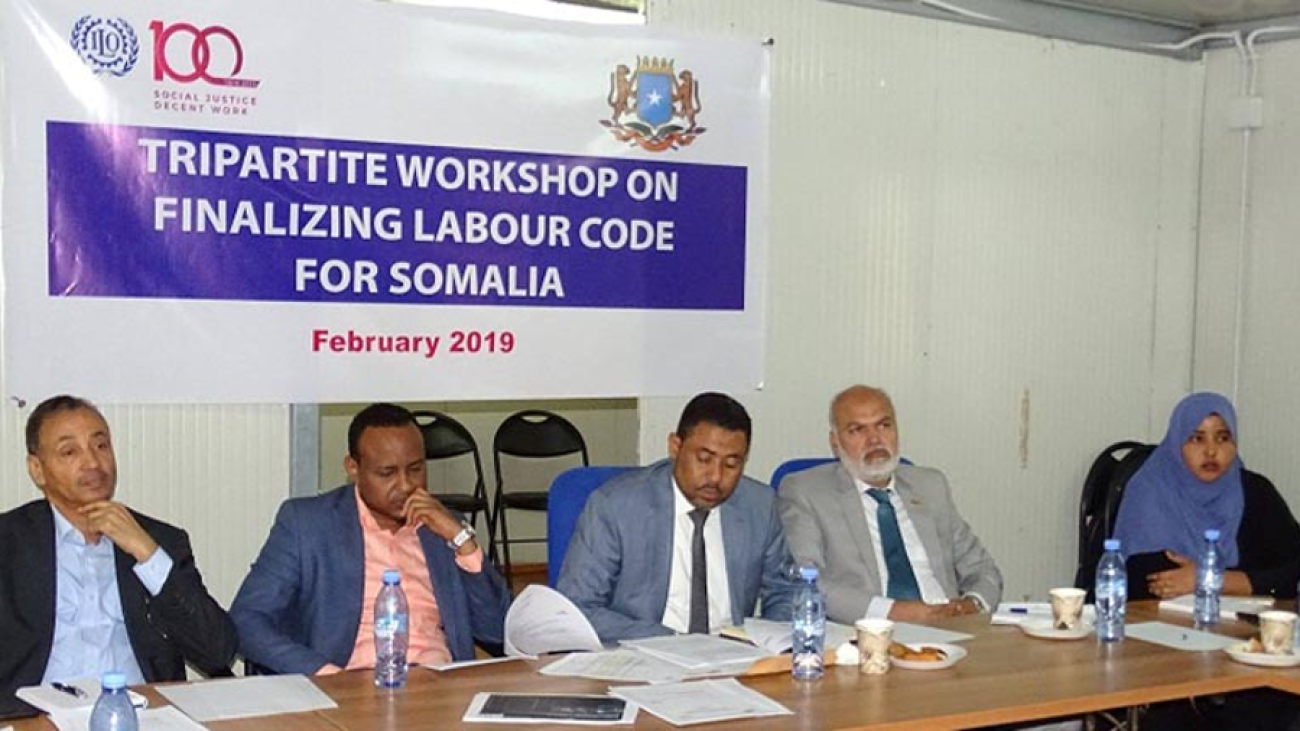« 100 Years – 100 Lives » | SOMALIA - “Social dialogue made it possible for us to reform the old labour law”

The ILO supported Somali social partners in reaching a compromise on a new Labour Code that offers better protection to all stakeholders.
MOGADISHIO – Omar Faruk Osman is a 42-year-old former journalist who has become the General Secretary of the Federation of Somali Trade Unions. He was among those who finalized the new Labour Code during a long negotiating process supported by the ILO Office in Somalia.
It was certainly not an easy task to modify a law which was enacted since 1972, at a time when Somalia was governed by a military government. The law offered very little protection for freedom of association and was far from standards observed by most countries.
Then, since 1991, Somalia went through a long civil conflict that brought down most government services. But as the ILO celebrates 100 years in 2019, Omar Faruk underlines the major role played by the ILO in his country throughout the years.
“When our country almost collapsed, the ILO did not run away and set up livelihood projects to help us survive,” he said.
“Then, once the situation stabilized again, the ILO went back to its core role of supporting the government, workers’ and employers’organizations to improve decent work opportunities and develop a national employment strategy. It also helped our country to set up social protection policies,” he added.
The trade unionist was particularly impressed by the role the ILO played in getting the government, employers’ and workers’ organizations to sit together and negotiate the new Labour Code. All this was unimaginable without ILO’s physical presence in Somalia.
Talks were tough but social dialogue made it possible to reach a compromise benefitting to all parties in the end. Considerable gains were made compared to the old labour law, especially when it comes to freedom of association and the protection of trade unionists.
Creating consensus
The revised Labour Code for Somalia was finalized in a 2-day tripartite workshop held in Mogadishu in February 2019. Representatives from various Ministries of the Federal Government of Somalia, all Federal Member States, employers, workers, and academia adopted a consensus draft of the Labour Code and agreed to send it to the Parliament for legislation.
The final draft is not only aligned with Somalia’s economic and social context – but also complies with the International Labour Standards and other UN Conventions ratified by the Government of Somalia, said Syed Saad Hussain Gilani, Head of the ILO Somalia Office.
The Federal Minister for Labour & Social Affairs (MoLSA), Hon. Salah Jama, thanked ILO for extending the technical support for revising the Labour Code. He emphasized that the Labour Code should be aligned to the principles of social justice and tripartite dialogue.
The Labour Code combines issues relating to fundamental principles and rights at work, employment contracts, labour relations, safety and health, industrial training, wages and remuneration, labour institutions and the institutions of social dialogue in a single legislation.
"There is no decent life without dignity and respect at work. This comes only from legal rights that protect workers against any form of abuses or exploitation from employers. In order to achieve this, the ILO has come a long way in setting internationally recognized workers' rights through a global and democratic deliberation processes. This Code is in the interest of our nation" commented Cisse M Xalane, from Somali Chamber of Commerce & Industries (SCCI).
Partner for development
“Following years of protracted internal conflict and natural calamities, Somalia is on a development path. ILO is a partner in the development of Somalia, working along with Government and social partners for the employment creation and promoting decent work for Somali women and men,” said Alexio Musindo, ILO Director for Ethiopia, Somalia, Djibouti, Sudan and South-Sudan
“The new Labour Code development will contribute towards a conducive environment for business, for formalization of the largely informal sectors at the same time providing necessary protection for workers against exploitations,” he concluded.
Link to original story



